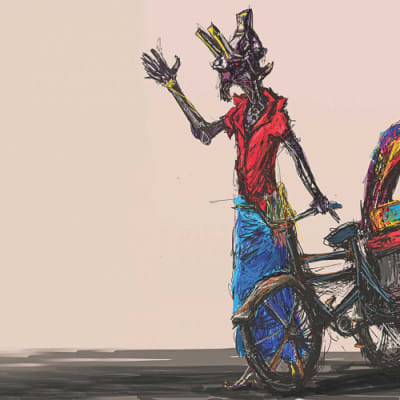Worldbuilding with Dhaka

Dhaka city can provide a wealth of inspiration for science fiction and fantasy.
All stories engage in worldbuilding but science fiction and fantasy put the greatest emphasis on it. Worldbuilding in these genres often demand the creation of entirely new planets if not galaxies. If that sounds like an impossible task, it is. Everyone cheats.
Worldbuilders borrow from the histories and cultures of the real world to create roadmaps, signposts and often templates for their fiction.
Naturally creators tend to draw primarily from their own surroundings and cultural contexts, until they become almost codified genre conventions. This is why the Standard Fantasy Setting exists as a trope, because so many of fantasy's defining authors were English-speaking Westerners who were inspired by stories of Medieval Western Europe. Science Fiction also tends to present a future of a homogeneous humanity that nevertheless often seems to be an extension of 21st century American culture.
While writing what you know is perfectly natural, the ubiquity of these standard settings can stifle creativity. Many worldbuilders, especially younger ones, intentionally try to break away from the mould. They look for inspiration in their own roots (hence an increase in fantasy games set in Eastern Europe and Scandinavia) and in cultures very different from their own – Japan being very popular. Inspiration can be drawn from any source, including Dhaka.
There is nothing wrong with someone born and raised in this city choosing to worldbuild something with knights in shining armour or with sneaky ninjas and dragons. However Dhaka lends itself well as fuel for certain genres of fantasy and sci-fi and these aspects of the city are well worth exploring.
The aesthetics of Dhaka are the easiest to borrow, and should definitely be included – but so much has been written about the look and feel of this city that it is redundant to devote very many more words to it. As it happens, worldbuilders often frame cultures in an iceberg metaphor: so for Dhaka the tea-stalls, the rickshaws and open sewers are merely the visible tip. The real substance lies in the abstract depths below.
A lot of fantasy settings have built-in class inequality, being stories about kings, nobles and peasants. However, Western writers often take this social hierarchy as a given without examining it, and works that do offer this commentary make it overt and fundamental to their plots. A Dhakaite can easily create a world where the characters are constantly negotiating issues of class and privilege in a complex, nuanced setting – without actively calling attention to it.

Dhaka is also a city that is voraciously urbanising and where new technologies have a relationship with local cultures that could best be described as "interesting". This makes it an unconventional but very fitting template for cyberpunk stories. This sci-fi genre loves its wet, crowded urban landscapes, disenfranchised protagonists and the uncertain promises of modernity. In the West cyberpunk is mostly a retro, nostalgia genre but the futures outlined in those old stories can easily be translated onto Dhaka's present. Inherently future-looking, cyberpunk could also be very interesting indeed when the set in a society struggling with issues of tradition, faith and propriety.
For we in Dhaka value religion, identity, family and social cohesion in a way that is alien to many Western worldbuilders. We are comfortable with the idea of someone being defined by their religion and their family life, and we generally find someone operating outside these bounds to be jarring. So a setting inspired by Dhaka would invest its characters with multiple layers of identity and groups to belong to, and the character's actions would be defined by the needs and beliefs of their groups. This departure from the lone protagonist tropes and individualism of Western conventions can provide for fresh stories.
Writers in developed countries would consider an open sewer a sign of a civilisation on its knees and portray everyone who lives with that sewer in their lives as miserable and cynical. A Dhaka-dweller just jumps across that sewer and gets a cup of tea without a second thought. A writer can learn from Dhaka and its inhabitants how to balance the realities of a difficult, stressful environment while retaining a basic optimism and decency. A Dhakaite can thus create a setting that superficially reflects the trend towards gritty dystopias while writing characters who manage to live their lives just fine without the need to swear a lot or crouch gloomily at night on rooftops.
In short, Dhaka is a fascinating treasure of worldbuilding ideas that can really help to create a society that is deeply divided across multiple lines and negotiates seemingly impossible obstacles with both nuance and ease. It's very good material for cyberpunk and dystopic science fiction, but can be applied to a variety of other genres at a more abstract level.
This city is more than its superficialities, and it's time we showed the world what it has taught us.

 For all latest news, follow The Daily Star's Google News channel.
For all latest news, follow The Daily Star's Google News channel. 



Comments